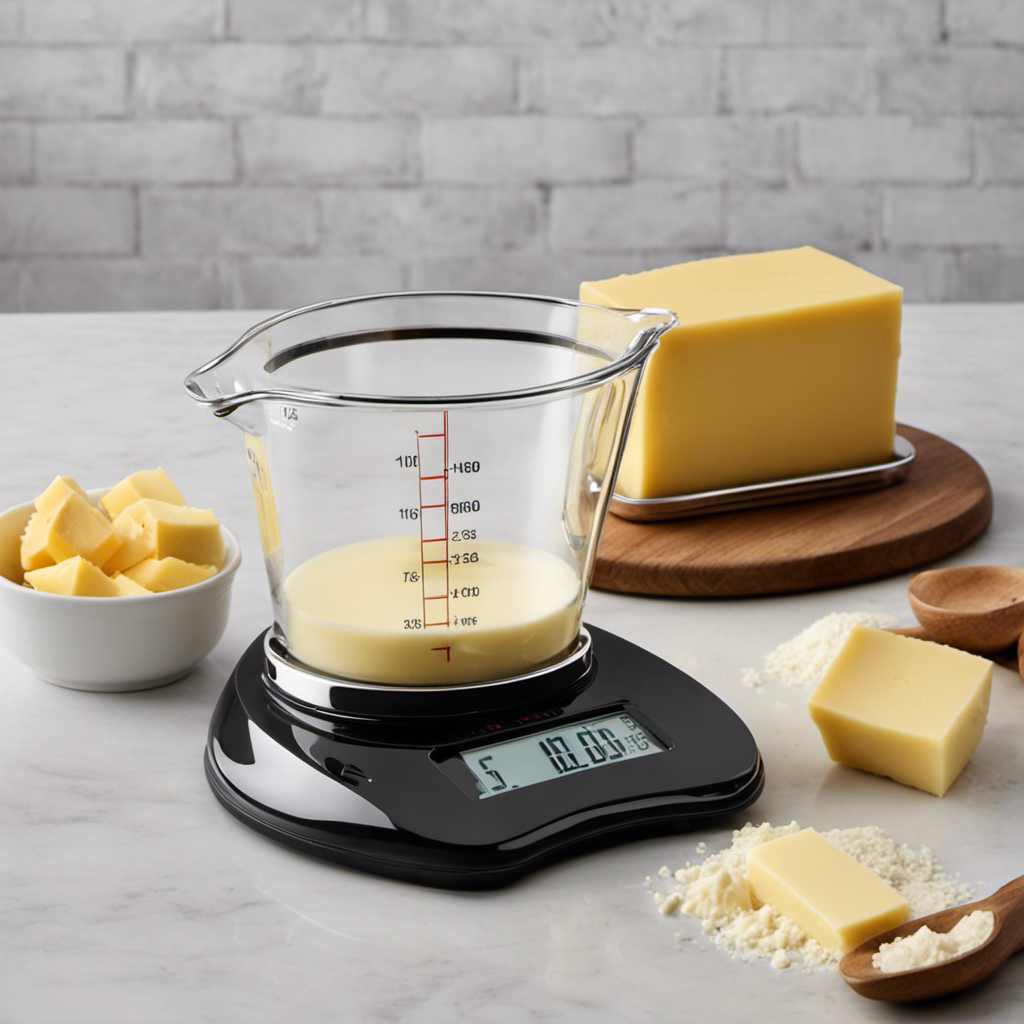When you're comparing plant-based butter alternatives, you'll find a variety of flavors and textures tailored to your needs. Nut-based butters offer rich, creamy options like almond or peanut, while coconut oil spreads provide a tropical kick. Soy-based butters are high in protein and mimic traditional butter's taste. Additionally, avocado and olive oil blends contribute healthy fats and enhance absorption of vitamins. Each alternative has distinct culinary uses, whether for baking, spreading, or cooking. Explore their nutritional benefits and cooking performance to find the perfect fit for your dishes. There's plenty more to uncover about these versatile options!
Key Takeaways
- Plant-based butters vary in flavor profiles, with nut-based options offering rich tastes and coconut spreads providing a tropical essence.
- Nutritional benefits differ; nut-based butters are high in healthy fats and protein, while soy-based options are lower in saturated fats.
- Ingredient quality matters; opt for whole, natural ingredients and avoid hydrogenated oils and artificial additives for healthier choices.
- Performance in cooking and baking can be similar to dairy butter, with most alternatives offering comparable moisture and texture in recipes.
- Popular brands like Miyoko's Creamery and Earth Balance each have distinct flavors and best uses, catering to different culinary needs.
Overview of Plant-Based Butters

In recent years, plant-based butters have emerged as a popular alternative to traditional dairy butter, catering to the growing demand for vegan and lactose-free options. You might find these spreads made from a variety of sources, including oils, grains, and legumes. They offer a wide range of flavors and textures, making them versatile for cooking, baking, or simply spreading on toast.
When you look for plant-based butter, you'll often come across options like coconut oil, olive oil, and avocado oil. These ingredients provide healthy fats and can enhance the flavor of your dishes. Many brands also fortify their products with vitamins and minerals, ensuring you get a nutritious alternative without sacrificing taste.
What's great is that plant-based butters can mimic the creamy texture of dairy butter, allowing you to enjoy your favorite recipes without concern for dietary restrictions.
Plus, they're often lower in saturated fats, making them a heart-healthy choice. As you explore the world of plant-based butters, you'll discover that they can elevate your meals while aligning with your dietary preferences and values.
Nut-Based Butter Alternatives

When you think about nut-based butter alternatives, you're tapping into a world rich in flavor and nutrition.
These spreads not only offer unique taste profiles but also pack a punch regarding health benefits.
Let's explore how they compare in both nutrition and flavor to find the perfect fit for your meals.
Nutritional Benefits Overview
Nut-based butter alternatives offer a wealth of nutritional benefits that can enhance your diet. These alternatives, made from almonds, cashews, walnuts, and other nuts, are packed with healthy fats, protein, and essential vitamins and minerals. You'll find them rich in monounsaturated fats, which can support heart health by helping to lower bad cholesterol levels.
Additionally, many of these nut-based options are available as dairy-free butter alternatives, making them suitable for those with dietary restrictions.
In addition to healthy fats, nut-based butters provide a good source of protein. A serving can offer a substantial protein boost, making them an excellent choice for vegetarians or anyone looking to increase their protein intake. They also contain important nutrients like vitamin E, magnesium, and potassium, all of which play crucial roles in your body's overall function.
Moreover, nut-based butters are a great option if you're looking to maintain or lose weight. Their healthy fats and protein can help keep you feeling full longer, reducing the likelihood of snacking on less nutritious options.
Just be mindful of portion sizes, as they can be calorie-dense. By incorporating nut-based butter alternatives into your meals or snacks, you can enjoy delicious flavors while reaping the numerous health benefits they offer.
Flavor Profiles Comparison
Exploring the flavor profiles of nut-based butter alternatives reveals a delightful variety that can enhance your culinary creations.
Almond butter, with its subtly sweet, nutty flavor, lends itself well to both sweet and savory dishes. It's perfect for smoothies, spreads, and even baking.
Cashew butter, on the other hand, offers a creamy texture and a mild, slightly sweet taste, making it an ideal base for sauces and dips.
Peanut butter, a classic favorite, boasts a robust, earthy flavor that works wonders in desserts and sandwiches alike.
If you're looking for something a bit more exotic, try macadamia nut butter, which has a rich, buttery taste that can elevate your recipes to new heights.
Hazelnut butter brings a distinctive, sweet, and slightly earthy profile, excellent in both desserts and savory dishes.
When you experiment with these nut-based alternatives, you'll discover how they can transform your meals. Each option has its unique appeal, allowing you to tailor flavors to your preferences.
Coconut Oil Spreads

Coconut oil spreads have taken the culinary world by storm, offering a creamy and flavorful alternative to traditional butters. You'll find these spreads made from coconut oil blended with other ingredients, making them versatile for a range of uses. They're perfect for slathering on toast, enhancing baked goods, or even cooking.
One of the standout features of coconut oil spreads is their rich, tropical flavor. This can bring an exciting twist to your favorite recipes. Plus, they're typically dairy-free, making them suitable for vegans and those with lactose intolerance. You'll also appreciate that many brands offer organic options, ensuring you're getting a clean product.
When it comes to health benefits, coconut oil is known for its medium-chain triglycerides (MCTs), which can provide quick energy and may support metabolism. However, keep in mind that while coconut oil spreads are a great option, moderation is key due to their calorie content.
As you explore these spreads, consider the various brands available. Some might include added flavors, while others focus on pure coconut richness. Overall, coconut oil spreads can be a delightful addition to your plant-based pantry.
Soy-Based Butter Options

If you're looking for another plant-based alternative, soy-based butter options might pique your interest. These spreads often blend soy protein with oils, giving you a creamy texture that works well in various recipes.
One of the great things about soy-based butter is its versatility; you can use it for baking, cooking, or simply spreading on toast.
Soy butter typically contains fewer saturated fats compared to traditional dairy butter, making it a healthier choice for many. Plus, it's packed with protein, which is a bonus if you're trying to increase your intake.
However, if you have a soy allergy, you'll want to steer clear of these options, as they can trigger adverse reactions.
When you're shopping, check for enriched varieties that include vitamins A and D, as these nutrients help mimic the nutritional profile of dairy butter.
You'll also want to look for organic brands when possible, as they typically offer higher-quality ingredients without harmful pesticides.
Avocado and Olive Oil Blends

Avocado and olive oil blends offer impressive nutritional benefits that can enhance your diet.
You'll find their flavor profiles bring a unique richness, making them versatile for various culinary uses.
Whether you're spreading it on toast or using it in cooking, these blends can elevate your meals effortlessly.
Nutritional Benefits Overview
While many people are exploring plant-based diets, blending avocado and olive oil offers impressive nutritional benefits. This combination not only enhances your meals but also supports your health in several ways.
Here's why you should consider incorporating this blend into your diet:
1. Heart Health: Both avocado and olive oil are rich in monounsaturated fats, which can help lower bad cholesterol levels, reducing your risk of heart disease.
Additionally, incorporating health benefits of various honeys into your diet can further support cardiovascular health.
2. Nutrient Absorption: Healthy fats aid in the absorption of fat-soluble vitamins (A, D, E, and K), ensuring your body utilizes the nutrients from your food effectively.
3. Antioxidant Boost: Olive oil is packed with antioxidants, which help combat oxidative stress, potentially lowering your risk of chronic diseases.
4. Anti-Inflammatory Properties: Avocado and olive oil contain compounds that may help reduce inflammation in your body, promoting overall wellness.
Flavor Profile Comparison
There's something uniquely delightful about the flavor profile of a blend combining avocado and olive oil. This combination offers a rich, creamy texture paired with a fruity, nutty essence that elevates any dish. When you spread it on bread or mix it into your favorite recipes, you'll notice how the avocado's buttery notes harmonize beautifully with the distinct, peppery undertones of olive oil.
To help you appreciate these flavors even more, here's a quick comparison:
| Flavor Component | Description |
|---|---|
| Avocado | Creamy, buttery, and slightly sweet |
| Olive Oil | Fruity, nutty, and peppery |
| Combined Experience | Rich, smooth, and well-rounded |
| Ideal Pairings | Bread, vegetables, and pasta |
This blend not only enhances the taste of your meals but also provides a unique option for those seeking plant-based alternatives. It's perfect for experimenting in the kitchen, allowing you to explore different flavor combinations while still enjoying healthy fats. Give it a try, and you'll see how versatile and delicious this pairing can be!
Culinary Uses and Versatility
In the kitchen, avocado and olive oil blends shine as versatile ingredients that can elevate a wide range of dishes. Their creamy texture and rich flavor make them perfect for various culinary applications, allowing you to experiment and enjoy healthier alternatives.
Here are four ways you can incorporate these blends into your cooking:
- Spreads and Dips: Use the blend as a delicious spread on toast or as a base for creamy dips that will wow your guests at any gathering.
- Cooking and Sautéing: Replace traditional butter or oil with this blend for sautéed vegetables or proteins, adding a layer of flavor that's hard to resist.
- Baking: Incorporate it into your baking recipes for cookies or muffins, giving them a moist and delightful texture.
- Dressings and Marinades: Whip up a zesty salad dressing or marinade, enhancing the freshness of your dishes while keeping them healthy.
With avocado and olive oil blends, you're not just cooking—you're creating flavorful experiences that nourish both body and soul.
Embrace the versatility and let your culinary creativity flourish!
Ingredients to Look For

When choosing plant-based butter alternatives, it's essential to pay attention to the ingredients list. Look for options that use high-quality oils like olive, avocado, or coconut, as these provide healthy fats and essential nutrients.
Avoid products that contain hydrogenated oils, which can introduce trans fats into your diet and may be harmful to your heart health.
You'll also want to check for natural flavorings and avoid artificial additives or preservatives. Ingredients such as nutritional yeast can add a rich flavor while providing additional vitamins, particularly B12.
If you're sensitive to allergens, read labels carefully for common allergens like soy or nuts.
Moreover, consider the presence of emulsifiers, which help maintain a creamy texture. Glycerin or lecithin derived from plants are generally safe choices.
Flavor Profiles and Uses

When choosing a plant-based butter alternative, you'll notice that different brands offer unique taste profiles that can enhance your cooking.
Some are rich and creamy, while others might've a more nutty or herbaceous flavor.
Understanding these differences will help you find the best uses for each alternative in your favorite recipes.
Taste Comparisons of Brands
As you explore the world of plant-based butter alternatives, you'll quickly notice that different brands offer distinct flavor profiles and culinary uses.
Each brand has its unique taste, which can elevate your dishes or leave you craving more. Here's a quick look at four popular options:
- Miyoko's Creamery: If you're after a rich, creamy taste reminiscent of traditional butter, this brand shines. Perfect for spreading on warm bread or using in pastries.
- Earth Balance: Known for its slightly nutty flavor, it's a versatile choice that works well in both baking and cooking. You'll love how it enhances your favorite recipes.
- Flora Plant Butter: This option offers a light, buttery flavor, making it ideal for delicate dishes. It's a delightful choice for sautéing veggies or drizzling over popcorn.
- Nutiva: With a hint of coconut, Nutiva adds a tropical twist to your meals. It's great for greasing pans or adding to smoothies for a creamy texture.
Finding your favorite plant-based butter can transform your cooking experience, allowing you to enjoy delicious, buttery flavors while sticking to your dietary preferences.
Best Uses in Cooking
You'll discover that plant-based butter alternatives can elevate your culinary creations in various ways, depending on their flavor profiles.
For instance, a nut-based butter, like cashew or almond, infuses a creamy richness that works beautifully in sauces and baked goods. It enhances the nuttiness of cookies and adds depth to savory dishes.
If you opt for a coconut-based alternative, its subtle sweetness and slight tropical flavor shine in desserts and curries. Try it in your favorite chocolate cake or as a base for a luscious frosting. You'll appreciate how it complements flavors without overpowering them.
For a more traditional flavor, look for a soy or canola-based butter. These tend to mimic dairy butter closely, making them great for spreading on toast or using in classic recipes like mashed potatoes.
You can also use them for sautéing vegetables, as they offer a balanced taste that suits various cuisines.
Nutritional Comparisons

Nutritional comparisons between plant-based butter alternatives and traditional dairy butter reveal significant differences that can influence your dietary choices.
While dairy butter is high in saturated fats and cholesterol, plant-based options often offer healthier profiles.
Here are four key points to reflect on:
- Heart Health: Plant-based butters typically contain unsaturated fats, which can help lower bad cholesterol levels, promoting better heart health.
- Vitamins and Antioxidants: Many plant-based alternatives are fortified with vitamins like B12 and D, essential for those on a vegan diet, while dairy butter lacks these nutrients.
- Caloric Content: Some plant-based options have fewer calories than dairy butter, making them a lighter choice for those watching their weight.
- Dietary Restrictions: If you're lactose intolerant or have a dairy allergy, plant-based butters provide a safe and delicious alternative without compromising flavor.
Cooking and Baking Performance

When it comes to cooking and baking, plant-based butter alternatives can perform surprisingly well, often matching or even exceeding the capabilities of traditional dairy butter. You'll find that many of these alternatives have a similar fat content, making them suitable for a variety of recipes.
Whether you're sautéing veggies, making a sauce, or whipping up a batch of cookies, you can confidently substitute plant-based butter without compromising flavor or texture.
In baking, plant-based butter usually provides a comparable rise and moisture, so your cakes and muffins should turn out just as fluffy and delicious. Many brands melt and cream just like dairy butter, allowing for smooth mixing and easy incorporation into your batter.
When it comes to cookies, you might notice a slightly different spread, but this can often be adjusted with simple tweaks to your recipe.
For cooking, plant-based options often handle high heat well, making them perfect for frying or roasting. Just keep an eye on the smoke point, as some alternatives may vary.
Choosing the Right Option

Finding the right plant-based butter alternative can enhance your cooking and baking experience even further. With so many options available, it's crucial to take into account your specific needs and preferences. Here are four factors to help you choose the best option:
1. Flavor: Think about the taste profile you want. Some alternatives have a strong coconut flavor, while others are more neutral. Pick one that complements your dishes.
Remember that butter adds flavor and moisture to baked goods, so finding a plant-based option that mimics this quality can elevate your recipes.
2. Texture: Different brands offer various consistencies. If you're baking, you might want something that mimics the creaminess of traditional butter.
3. Ingredient Quality: Check the label for high-quality, whole ingredients. Avoid those filled with preservatives or artificial additives to guarantee you're eating healthily.
4. Purpose: Reflect on what you'll be using it for. Some alternatives work better for cooking, while others shine in baking or spreading.
Frequently Asked Questions
Are Plant-Based Butters Suitable for People With Nut Allergies?
If you have nut allergies, you should carefully check the ingredients of plant-based butters. Some may contain nuts or be processed in facilities that handle nuts, which could pose a risk for you. Always read labels!
How Long Do Plant-Based Butters Typically Last Once Opened?
Once you open plant-based butter, it usually lasts about 1 to 3 months in the refrigerator. Always check for any off smells or discoloration to verify it's still good to use. Enjoy your cooking!
Can I Make My Own Plant-Based Butter at Home?
Yes, you can definitely make your own plant-based butter at home! Simply blend nuts or seeds with oils, add flavorings like garlic or herbs, and freeze for a delicious, customizable alternative to store-bought options.
Do Plant-Based Butters Contain Any Artificial Additives or Preservatives?
Many store-bought plant-based butters contain artificial additives or preservatives. For instance, a popular brand uses emulsifiers to improve texture. Always check labels to guarantee you're choosing a product that aligns with your health goals.
Are There Any Environmental Benefits to Using Plant-Based Butters?
Using plant-based butters can reduce your carbon footprint, conserve water, and lessen deforestation compared to dairy products. By choosing these alternatives, you're supporting sustainable practices and contributing to a healthier planet for future generations.
Conclusion
When it comes to plant-based butter alternatives, you might wonder if they truly match up to traditional butter. The truth is, while they offer unique flavors and health benefits, not all options perform the same in cooking or baking. By understanding the differences among nut, coconut, soy, and oil-based spreads, you can choose the perfect one for your needs. So, experiment with these alternatives and discover how they can elevate your meals without compromising on taste!









